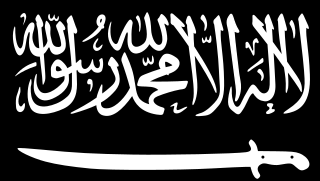
Abu Omar al-Baghdadi, born Hamid Dawud Mohamed Khalil al-Zawi was an Iraqi militant who was the Emir of the Islamic militant umbrella organization Mujahideen Shura Council (MSC), and its successor, the Islamic State of Iraq (ISI), which fought against the U.S.-led Coalition forces during the Iraqi insurgency.

Vilayat Dagestan, formerly known as Shariat Jamaat, was an Islamist Jihadist group based in the Russian republic of Dagestan and is part of the Caucasus Emirate. The group is closely associated with the separatist conflicts in the nearby Russian republics of Chechnya and Ingushetia, and was created during the Second Chechen War in favor of Dagestan's independence as an Islamic state.

The Islamic State of Iraq was a Salafi jihadist militant organization that fought the forces of the U.S.-led coalition during the Iraqi insurgency. The organization aimed to overthrow the Iraqi federal government and establish an Islamic state governed by Sharia law in Iraq.
Aliaskhab Alibulatovich Kebekov, also known as Ali Abu Muhammad, was a North Caucasian militant Islamist in Russia and the leader of the Caucasus Emirate following the death of inaugural leader Dokka Umarov. Following in the same religious tradition as Umarov, he adhered to the ideology of Salafism. The United States Department of State added Kebekov to its list of Specially Designated Global Terrorists on March 25, 2015. On 19 April 2015, Kebekov was killed by Russian security forces during special operations in the settlement of Gerei-Avlak in Buynaksk. An Avar by nationality, Kebekov was the first non-Chechen to lead the North Caucasus insurgency.

The Islamic State – Algeria Province was a branch of the militant Islamist group Islamic State (IS), active in Algeria. The group was formerly known as Jund al-Khilafah fi Ard al-Jazair. Originally a faction of al-Qaeda in the Islamic Maghreb (AQIM), the group split from AQIM and pledged alliance to IS in September 2014. The group received noteriety later in the same month for the kidnapping and beheading of French citizen Hervé Gourdel. After a subsequent campaign by Algerian authorities killed many of its members and leaders, the group significantly declined in activity and effectively dissolved after May 2015.

The Military of the Islamic State is the fighting force of the Islamic State (IS). The total force size at its peak was estimated from tens of thousands to over 200,000. IS's armed forces grew quickly during its territorial expansion in 2014. The IS military, including groups incorporated into it in 2014, openly operates and controls territory in multiple cities in Libya and Nigeria. In October 2016, it conquered the city of Qandala in Puntland, Somalia. It conquered much of eastern Syria and western Iraq in 2014, territory it lost finally only in 2019. It also has had border clashes with and made incursions into Lebanon, Iran, and Jordan. IS-linked groups operate in Algeria, Pakistan, the Philippines, and in West Africa. In January 2015, IS was also confirmed to have a military presence in Afghanistan and in Yemen.

In October 2014, the self-declared Islamic State of Iraq and the Levant (ISIL) took control of numerous government buildings, security vehicles and local landmarks in the Eastern Libyan coastal city of Derna. Although some media outlets reported the control as being absolute, rival groups like the al-Qaeda-affiliated Abu Salim Martyrs Brigade continued to control parts of the city. Clashes erupted between ISIL and an alliance of Islamist groups in June 2015, with ISIL retreating from Derna to outlying suburbs the following month. However, clashes continued between the Islamist alliance and the Tobruk-based government forces.

The Islamic State (IS) had its core in Iraq and Syria from 2013 to 2017 and 2019 respectively, where the proto-state controlled significant swathes of urban, rural, and desert territory, mainly in the Mesopotamian region. Today the group controls scattered pockets of land in the area, as well as territory or insurgent cells in other areas, notably Afghanistan, West Africa, the Sahara, Somalia, Mozambique, and the Democratic Republic of the Congo. As of 2023, large swathes of Mali have fallen under IS control.

The Islamic State – Libya Province is a militant Islamist group active in Libya under three branches: Fezzan Province in the desert south, Cyrenaica Province in the east, and Tripolitania Province in the west around Tripoli, Libya's capital city. The branches were formed on 13 November 2014, following pledges of allegiance to IS leader Abu Bakr al-Baghdadi by militants in Libya.

The Islamic State – Caucasus Province(IS-CP) is a branch of the militant Islamist group Islamic State (IS), that is active in the North Caucasus region of Russia. IS announced the group's formation on 23 June 2015 and appointed Rustam Asildarov as its leader. Although it was defeated militarily as an organized force by 2017, some lone wolves still act on behalf of the Islamic State.

The Islamic State – Sinai Province was a branch of the jihadist organization Islamic State that was active in the Sinai Peninsula of Egypt.
This article contains a timeline of events from January 2015 to December 2015 related to the Islamic State of Iraq and the Levant (ISIL/ISIS). This article contains information about events committed by or on behalf of the Islamic State, as well as events performed by groups who oppose them.

The Islamic State – Yemen Province is a branch of the militant Islamist group Islamic State (IS), active in Yemen. IS announced the group's formation on 13 November 2014.

The Islamic State – Somalia Province or Abnaa ul-Calipha is an Islamic State affiliate that primarily operates in the mountainous areas of Puntland, and which has also claimed responsibility for several terrorist attacks throughout the rest of Somalia. The group first appeared in the latter half of 2015 when pro-Islamic State fighters within Al-Shabaab defected and pledged allegiance to ISIS caliph Abu Bakr al-Baghdadi. Led by Sheikh Abdul Qadir Mumin, the group has an estimated 500-700 fighters.

Ansar Khalifa Philippines (AKP), also referred to as Ansar al-Khilafah in the Philippines and Ansarul Khilafah Philippines was a Philippine-based militant group that emerged in August 2014 when it released a video pledging allegiance to ISIS. The Armed Forces of the Philippines characterized the group as "bandits" engaging in cattle rustling and extortion activities. Malaysia listed the group as terrorist organization in 2019.
The Philippines is one of the state opponents of the militant group, Islamic State of Iraq and the Levant (ISIL), more commonly referred to by the local media as the Islamic State of Iraq and Syria (ISIS).
The origins of the Islamic State group can be traced back to three main organizations. Earliest of these was the "Jamāʻat al-Tawḥīd wa-al-Jihād" organization, founded by the Jihadist leader Abu Mus'ab al-Zarqawi in Jordan in 1999. The other two predecessor organizations emerged during the Iraqi insurgency against the U.S. occupation forces. These included the "Jaish al-Ta'ifa al-Mansurah" group founded by Abu Omar al-Baghdadi in 2004 and the "Jaysh Ahl al-Sunnah wa’l-Jama’ah" group founded by Abu Bakr al-Baghdadi and his associates in the same year.

The Islamic State insurgency in the North Caucasus is ongoing terror activity of the Islamic State branch in the North Caucasus after the insurgency of the Caucasus Emirate.

The Uqba ibn Nafi Brigade, also known as Katibat Uqba Bin Nafi, is a Tunisian Salafi jihadist organization named after Uqba ibn Nafi, it was established in 2012 in order to create a Tunisian jihadist group linked to Al-Qaeda In the Maghreb and later, the Islamic State.
Abu Hafs al-Hashimi al-Qurashi is the fifth and current caliph of the Islamic State. He was named as caliph on the 3 August, 2023, in an audio message by the spokesperson of the IS, Abu Hudhayfah Al-Ansari, whose announcement came four months after the death of his predecessor Abu al-Hussein al-Husseini al-Qurashi.












